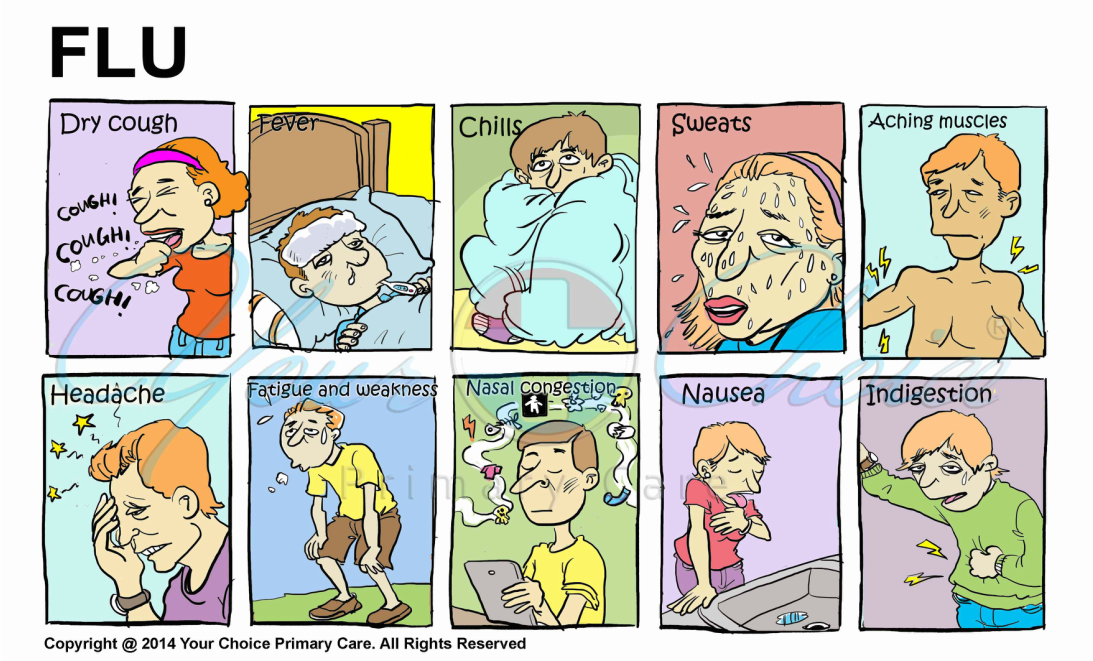Influenza is a viral infection that attacks your respiratory system — your nose, throat and lungs
Influenza and its complications can be deadly. People at higher risk of developing flu complications include:
- Young children
- Adults older than 65
- Pregnant women
- People with weakened immune systems
- People who have chronic illnesses
Initially, the flu may seem like a common cold with a runny nose, sneezing and sore throat. But colds usually develop slowly, whereas the flu tends to come on suddenly. And although a cold can be a nuisance, you usually feel much worse with the flu.
Common signs and symptoms of the flu include:
- Fever over 100.4 F
- Aching muscles, especially in your back, arms and legs
- Chills and sweats
- Headache
- Dry cough
- Fatigue and weakness
- Nasal congestion
- Nausea, indigestion, loose stool
If you have flu symptoms and are at risk of complications, see your doctor right away. Taking antiviral drugs within the first 48 hours after you first notice symptoms may reduce the length of your illness and help prevent more-serious problems.
Flu viruses travel through the air in droplets when someone with the infection coughs, sneezes or talks. You can inhale the droplets directly, or you can pick up the germs from an object — such as a telephone or computer keyboard — and then transfer them to your eyes, nose or mouth.
People with the virus are likely contagious from the day before symptoms first appear until five to 10 days after symptoms begin. Children and people with weakened immune systems may be contagious for a slightly longer time.
Influenza viruses are constantly changing, with new strains appearing regularly. If you've had influenza in the past, your body has already made antibodies to fight that particular strain of the virus. If future influenza viruses are similar to those you've encountered before, either by having the disease or by vaccination, those antibodies may prevent infection or lessen its severity.
But antibodies against flu viruses you've encountered in the past can't protect you from new influenza subtypes that are very different immunologically from what you had before. A number of virus subtypes have appeared in humans since the global epidemic (pandemic) of 1918, which killed tens of millions of people.
Factors that may increase your risk of developing influenza or its complications include:
- Age. Seasonal influenza tends to target young children and people over 65. The pandemic H1N1 virus that surfaced in 2009, however, appeared to be most common in teenagers and young adults.
- Occupation. Health care workers and child care personnel are more likely to have close contact with people infected with influenza.
- Living conditions. People who live in facilities along with many other residents, such as nursing homes or military barracks, are more likely to develop influenza.
- Weakened immune system. Cancer treatments, anti-rejection drugs, corticosteroids and HIV/AIDS can weaken your immune system. This can make it easier for you to catch influenza and may also increase your risk of developing complications.
- Chronic illnesses. Chronic conditions, such as asthma, diabetes or heart problems, may increase your risk of influenza complications.
- Pregnancy. Pregnant women are more likely to develop influenza complications, particularly in the second and third trimesters.
- Pneumonia
- Bronchitis
- Asthma flare-ups
- Sinus infections
- Ear infections
Your doctor may prescribe an antiviral medication, such as oseltamivir (Tamiflu) or zanamivir (Relenza). If taken soon after you notice symptoms, these drugs may shorten your illness by a day or so and help prevent serious complications.
Oseltamivir is an oral medication. Zanamivir is inhaled through a device similar to an asthma inhaler and shouldn't be used by anyone with respiratory problems, such as asthma and lung disease.
If you do come down with the flu, these measures may help ease your symptoms:
- Drink lots of fluids. Electrolyte solutions such as pedialyte, powerade, gatorade are all good choices. They help replace fluids and electrolytes lost during mucus production or fever. Avoid alcohol and caffeine, which can cause dehydration, and cigarette smoke, which can aggravate your symptoms.
- Rest. Get more sleep to help your immune system fight infection.
- Consider pain relievers. Use an over-the-counter pain reliever, such as acetaminophen (Tylenol, others) or ibuprofen (Advil, Motrin IB, others), to combat the achiness associated with influenza. Don't give aspirin to children or teens because of the risk of Reye's syndrome, a rare, but potentially fatal disease.
Each year's seasonal flu vaccine contains protection from the three or four influenza viruses that are expected to be the most common during that year's flu season. The vaccine is typically available as an injection or as a nasal spray.
Controlling the spread of infection
The influenza vaccine isn't 100 percent effective, so it's also important to take measures to reduce the spread of infection:
- Wash your hands. Thorough and frequent hand-washing is an effective way to prevent many common infections. Or use alcohol-based hand sanitizers if soap and water aren't readily available.
- Contain your coughs and sneezes. Cover your mouth and nose when you sneeze or cough. To avoid contaminating your hands, cough or sneeze into a tissue or into the inner crook of your elbow.
- Avoid crowds. Flu spreads easily wherever people congregate — in child care centers, schools, office buildings, auditoriums and public transportation. By avoiding crowds during peak flu season, you reduce your chances of infection. And, if you're sick, stay home so that you don't infect others.


